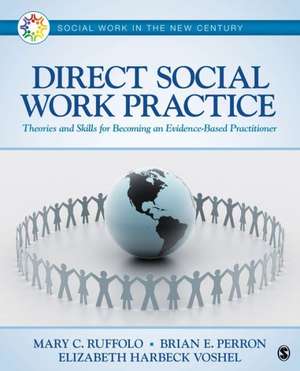Direct Social Work Practice: Theories and Skills for Becoming an Evidence-Based Practitioner: Social Work in the New Century
Autor Mary C. (Carmel) Ruffolo, Brian E. Perron, Elizabeth Harbeck Voshelen Limba Engleză Paperback – 4 mai 2015
Preț: 834.34 lei
Preț vechi: 1083.56 lei
-23% Nou
Puncte Express: 1252
Preț estimativ în valută:
159.67€ • 165.75$ • 133.14£
159.67€ • 165.75$ • 133.14£
Carte disponibilă
Livrare economică 04-18 martie
Preluare comenzi: 021 569.72.76
Specificații
ISBN-13: 9781483379241
ISBN-10: 1483379248
Pagini: 280
Dimensiuni: 187 x 232 x 18 mm
Greutate: 0.47 kg
Ediția:1
Editura: SAGE Publications
Colecția Sage Publications, Inc
Seria Social Work in the New Century
Locul publicării:Thousand Oaks, United States
ISBN-10: 1483379248
Pagini: 280
Dimensiuni: 187 x 232 x 18 mm
Greutate: 0.47 kg
Ediția:1
Editura: SAGE Publications
Colecția Sage Publications, Inc
Seria Social Work in the New Century
Locul publicării:Thousand Oaks, United States
Cuprins
Chapter 1: An Overview of the Book
What Is Generalist Social Work Practice?
Major Themes in Each Chapter
How This Book Is Organized
Suggestions for the Social Work Student
Suggestions to the Social Work Instructor
Chapter 2: Integrative Themes That Guide Social Work Practice with Individuals, Families, and Small Groups
Definition of Social Work Profession and Principles of the Profession
The Mission of Social Work
Social Justice Lens
Core Theoretical Perspectives
Integrating Conceptual Perspectives
Chapter 3: From Evidence-Based Practice to Evidence-Informed Practice
Defining Evidence-Based Practice (EBP)
The Challenges in Using the EBP framework in Social Work
Chapter 4: Professional Values, Ethics, and Professional Use of Self
Professional Social Work Values, Purpose, and Practice Principles
NASW Code of Ethics Standards
Ethical Decision Making
A Closer Look at Self-determination, Informed Consent and Confidentiality, Privileged Communication, and Technology/Social Media Use
Addressing Malpractice and Unethical Behavior
Chapter 5: Engagement and Relationship-Building Skills
Core Values That Guide Engagement and Relationship-Building Efforts in Social Work Practice
Pathways to Services
Approaches That Positively Impact the Engagement Phase
Skill Building That Emphasizes Collaboration to Improve Follow-Through
The Stages of Change Framework
Alliance Building
Chapter 6: Assessment in Social Work With Individuals and Families
Defining Assessment
The Bio-Psycho-Social-Spiritual History
Key Screening Tools
Trauma Assessments and Mandated Reporting Responsibilities
Diagnostic and Statistical Manual of Mental Disorders (DSM-5), Cultural Assessment Tools in the DSM-5, and International Statistical Classification of Diseases and Related Health Problems (ICD-10)
Chapter 7: Change Planning
What Is Change Planning?
Core Principles of Change Planning
Change Goals
Goal Selection
Goal Specification: A SMART Approach
Intervention Selection
The Written Change Plan
Chapter 8: Core Intervention Skills: Using Cognitive and Behavioral Approaches in Social Work Practice With Individuals, Families, and Groups
The Cognitive Aspect of CBT
Cognitive Restructuring
Behavioral Aspects of CBT
ABC from a Behavioral Standpoint
CBT as an Integrative Framework
Practice of CBT
Structural Features of CBT
Ongoing Professional Development
Chapter 9: Intervention Skills: Using Problem-Solving, Psychoeducational, and Multisystemic Intervention Approaches and Case/Care Management Skills in Working With Individuals and Families
Problem-Solving Approach
Psychoeducational Approach
The Substance Abuse and Mental Health Service Administration (SAMHSA) Evidence-Based Toolkit
Online Psychoeducational Modules
Multiple-Family Psychoeducation Program (MF-PEP)
Multisystem Intervention Approaches
Case/Care Management Approaches
Chapter 10: Additional Skills for Working With Families and Groups
Introducing the Core Skills Needed When Working With Families and Helping Families to Change
Social Work’s Mission in Working With Families
A Multidimensional Ecosystemic Comparative Approach (MECAmaps) to Assess Cultural and Contextual Sociopolitical Contexts
Establishing a Relationship With Each Family Member
Models of Family Work
Special Note: Working With Couples
Introducing the Core Skills Needed When Working With Groups
Leading Groups and Understanding Group Development Stages
Chapter 11: Outcome Monitoring
Overview of Outcome Monitoring
Is Outcome Monitoring Research?
General Principles of Outcome Monitoring
Measurement Types and Data Collection
Summarizing Data and Making Inferences
Common Measurement Questions
Chapter 12: Lifelong Learning and Professional Development Over the Life Course
Your Professional Identity
Supervision and Mentorship
Remaining Current With the Research
Licensure
Continuing Education
Professional Social Networks
What Is Generalist Social Work Practice?
Major Themes in Each Chapter
How This Book Is Organized
Suggestions for the Social Work Student
Suggestions to the Social Work Instructor
Chapter 2: Integrative Themes That Guide Social Work Practice with Individuals, Families, and Small Groups
Definition of Social Work Profession and Principles of the Profession
The Mission of Social Work
Social Justice Lens
Core Theoretical Perspectives
Integrating Conceptual Perspectives
Chapter 3: From Evidence-Based Practice to Evidence-Informed Practice
Defining Evidence-Based Practice (EBP)
The Challenges in Using the EBP framework in Social Work
Chapter 4: Professional Values, Ethics, and Professional Use of Self
Professional Social Work Values, Purpose, and Practice Principles
NASW Code of Ethics Standards
Ethical Decision Making
A Closer Look at Self-determination, Informed Consent and Confidentiality, Privileged Communication, and Technology/Social Media Use
Addressing Malpractice and Unethical Behavior
Chapter 5: Engagement and Relationship-Building Skills
Core Values That Guide Engagement and Relationship-Building Efforts in Social Work Practice
Pathways to Services
Approaches That Positively Impact the Engagement Phase
Skill Building That Emphasizes Collaboration to Improve Follow-Through
The Stages of Change Framework
Alliance Building
Chapter 6: Assessment in Social Work With Individuals and Families
Defining Assessment
The Bio-Psycho-Social-Spiritual History
Key Screening Tools
Trauma Assessments and Mandated Reporting Responsibilities
Diagnostic and Statistical Manual of Mental Disorders (DSM-5), Cultural Assessment Tools in the DSM-5, and International Statistical Classification of Diseases and Related Health Problems (ICD-10)
Chapter 7: Change Planning
What Is Change Planning?
Core Principles of Change Planning
Change Goals
Goal Selection
Goal Specification: A SMART Approach
Intervention Selection
The Written Change Plan
Chapter 8: Core Intervention Skills: Using Cognitive and Behavioral Approaches in Social Work Practice With Individuals, Families, and Groups
The Cognitive Aspect of CBT
Cognitive Restructuring
Behavioral Aspects of CBT
ABC from a Behavioral Standpoint
CBT as an Integrative Framework
Practice of CBT
Structural Features of CBT
Ongoing Professional Development
Chapter 9: Intervention Skills: Using Problem-Solving, Psychoeducational, and Multisystemic Intervention Approaches and Case/Care Management Skills in Working With Individuals and Families
Problem-Solving Approach
Psychoeducational Approach
The Substance Abuse and Mental Health Service Administration (SAMHSA) Evidence-Based Toolkit
Online Psychoeducational Modules
Multiple-Family Psychoeducation Program (MF-PEP)
Multisystem Intervention Approaches
Case/Care Management Approaches
Chapter 10: Additional Skills for Working With Families and Groups
Introducing the Core Skills Needed When Working With Families and Helping Families to Change
Social Work’s Mission in Working With Families
A Multidimensional Ecosystemic Comparative Approach (MECAmaps) to Assess Cultural and Contextual Sociopolitical Contexts
Establishing a Relationship With Each Family Member
Models of Family Work
Special Note: Working With Couples
Introducing the Core Skills Needed When Working With Groups
Leading Groups and Understanding Group Development Stages
Chapter 11: Outcome Monitoring
Overview of Outcome Monitoring
Is Outcome Monitoring Research?
General Principles of Outcome Monitoring
Measurement Types and Data Collection
Summarizing Data and Making Inferences
Common Measurement Questions
Chapter 12: Lifelong Learning and Professional Development Over the Life Course
Your Professional Identity
Supervision and Mentorship
Remaining Current With the Research
Licensure
Continuing Education
Professional Social Networks
Notă biografică
Descriere
A foundational text for students learning to work with individuals, families and communities, this book covers the basic skills of engagement, assessment, intervention and reflective practice. Through the use of reality-based case examples and sample dialogue, the authors help students apply theory to practice and develop their essential reflective and critical thinking skills.















